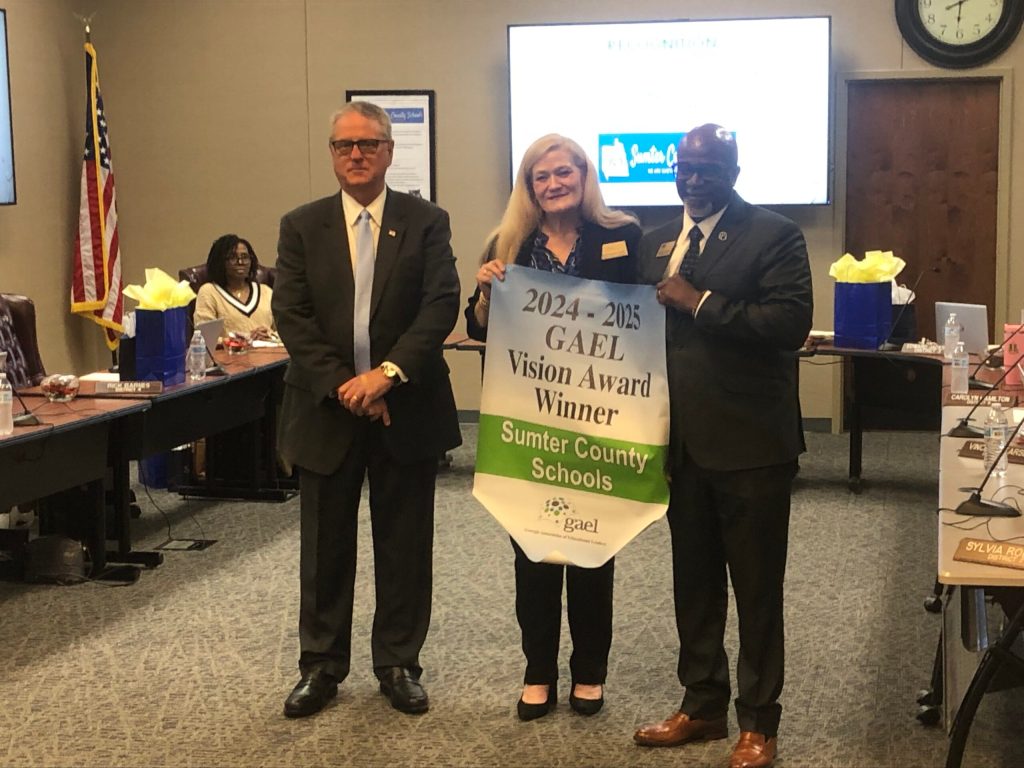Sumter County school board sees net decrease in school climate scores and puts robot to teach social skills on consent agenda
Published 9:22 pm Thursday, March 13, 2025

- Hiedi Goodin (middle), STEM coordinator for RESA, presented Superintendent Walter Knighton (right) with a GAEL vision award, with Richard McCorkle (left), Director of Chattahoochee Flint RESA.
The Sumter County Board of Education met on March 11. Hiedi Goodin, STEM coordinator for RESA, presented Superintendent Walter Knighton with a GAEL vision award. The award was based off of the number of GAEL members in the district. “GAEL just appreciates your commitment to the professional development of educational leaders.”
Richard McCorkle, Director of Chattahoochee Flint RESA, gave information about the student advisory Board. The Board is made up of two students from each district. He stated that on the 13th they would have lunch at the Capitol with a number of legislators. The students from Sumter County are Victoria Aguirre and Aaron Kearse. Last year, student representatives were able to talk to the State School Superintendent for over an hour. “Those kids just do a great job representing all of our districts, and we are the only one of the 16 RESA’s that. . . has a student advisory board.”
Goodin commented on the student representatives. “I’m just going to tell you your two advisory board members are amazing.”
Knighton shared the school climate STAR ratings comparison, which measures school climate. Factors include school wide discipline, school safety, freedom from controlled substances, and parent, student surveys, and staff surveys. For the 2023-2024 school year, Sumter County Primary School received a 96.60, a 3.9 increase over the prior year, Sumter County Elementary School received a 92.20, an increase of 3, Sumter County Intermediate School received a 85.20, a decrease of 5.4, Sumter County Middle School received 74.20, a decrease of 3.9, and Sumter County Highschool received a 69.60, a decrease of 6.9.
Dr. Andrea Ingram brought information about the Inside Sumter Campaign, detailing Youtube videos that they had released covering the Health Clinic and Sensory Rooms. The Board viewed the video on sensory rooms, which shared how the rooms allowed students to rest from sensory overload or gain access to sensory input. The channel can be found at: https://www.youtube.com/@InsideSumterCountySchools.
Director of Operations Phillip Harper gave updates, starting with the Sumter County Primary School reroofing project. “We posted an invitation to bid on our Sumner County district website and to the Georgia State Procurement website on March the third, the bidding will end on April the third, at 3pm.” He stated they had received numerous responses.
He gave updates on the Sumter County Middle School. “The painting in the main gym has already been completed, which is good because they already started to install the flooring. So they’ve got the sub floor done.” He stated he expected them to start installing the actual floor by the end of the week.
Knighton also gave reports on billing. “Our Georgia Power bill for the month of February is at $50,000, our Sumter EMC is at $60,000, our City of America’s energy $13,000.”
Harper stated that bills were lagging, and had occurred during the previous cold weather. Knighton also mentioned rate increases.
Harper stated energy costs were rising. “Not only has our energy costs been going up because of usage, it’s been going up because of rate hikes.” He stated there was an energy management system by a company called HI Solutions. Harper stated they had a proposal to put ten meters in the schools that would monitor energy use and alert them to unusual energy consumption. He also stated that they would receive information about rate increases from the power company, giving the hypothetical example of high costs in the evening sparking them to heat buildings earlier in the day.
The initial hardware requires a one-time cost of $27,000. Annual costs are $20,000. School Board member Rick Barnes questioned Harper as to how they could save money with the system. Barnes argued whether they already had systems to regulate power use now, to which Harper replied; “we have a small program where we can do that. There’s nothing that’s automatic though.” The Board decided not to put it on the consent agenda.
Knighton also brought information about the Ag Building, stating they were planning on hosting a grand opening in April.
Harper gave details. “Most everything’s been done. . . some of the delays have been because of vendors. One of them is Georgia Power, so we’re waiting to lay sod until they come out to put in the lines for the lights in the yard and the parking lot area.”
Harper gave updates on the old Americus Highschool. “I’ve been in contact with realtor for commercial property. He’s out of Macon.” Harper stated he gave him a proposal for how much it would cost to evaluate the property.
The Board heard a request by Vamsee Mallenine for a robot from RoboKind. “They are the only commercially available robots which actually display realistic facial expressions for the mimicking of facial expressions.” The software system is widely used for autistic children to learn facial expressions. Mallenine stated they had 25 students in the preschool program who had some type of autistic characteristic. “Now, with this package, we also we will get one robot for the primary school. With that one robot, every teacher, every classroom in the primary school will be also able to use a virtual avatar of the same equipment.” The robot requires a yearly subscription of $6,000 for all services.
Knighton gave details on the robots after the meeting. “It’s actually working with them on appropriate facial expressions, with reading, and also to help with regulation as well.”
When asked how accurately a robot could make facial expressions, Knighton replied; “extremely accurate. The research is already centered behind it. There are some states that bought [them] for their entire state.” He stated that Furlow used them.
Knighton gave the preliminary cash flow report. The day-to-day general fund balance as of February 28 was $17,379,367.87, combined capitol and special projects funds as of February 28 was $5,816,118.51. Knighton gave the balance for the middle school project as $1,069,309.55, which will be deducted from the capitol and special projects fund. Knighton gave the SPLOST revenue for the month of February as $407,206.66.
Knighton stated they were at 66.66% of their operational year. Revenue was at 54.14%. “We’ve only spent out 46.02%, so we brought in more revenue at this particular time than what we spent out.” Knighton gave the remaining 396 fund balance of $18,220,897.61. He also gave the net worth of the school nutrition program, as of January 31, as $1,229,961.73. He gave the remaining balance on the debt service as $10,645,350. The last payment was $3,335,675 which was paid in October. The next payment is due April.
Knighton discussed budgeting, stating that April was when the Department of Education usually gave information about allotments. “Currently, without the State sources and QBE and without identifying the FY 25 local reserve, we see that we have an anticipated revenue of around $19,586,997.” He gave the anticipated expenditures as $57,651,846. He stated anticipated federal funding was $7,639,212 but that the exact amount was uncertain.





